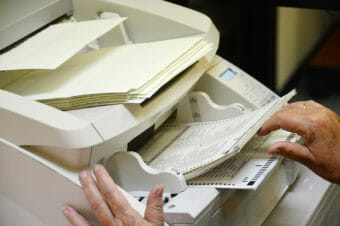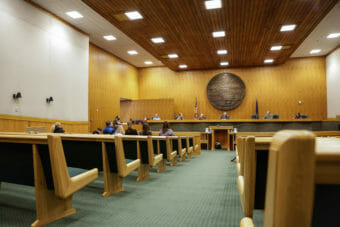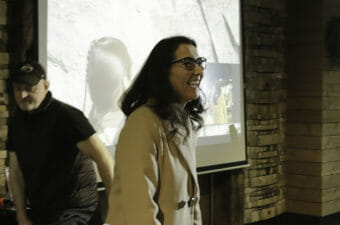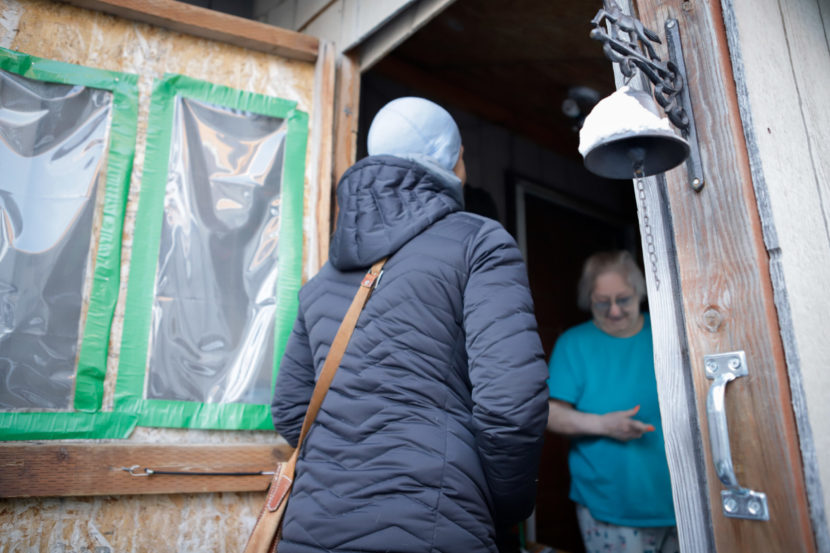
As the sun set over Turnagain Arm, Caroline Storm trudged through unshoveled snow to knock on doors in a middle-class South Anchorage neighborhood tucked between two highways.
“Let’s try Peggy and Hannah,” she said, looking at an app on her phone that lists registered voters and addresses. Storm rapped on the window of an older, corner house. A few seconds later Peggy Baker stepped into the chilly arctic entry, and Storm launched into her spiel.
“Peggy, my name is Caroline Storm,” she said. “I’m running for state House and going door-to-door to meet voters.”
Storm is a Democrat running in a three-way race for state House in a part of Anchorage called Bayshore/Klatt.
“Is this the first time you’re running?” Baker asked Storm. “You’re [from] this area?”
Storm explained it’s her first time and that she’s a local.
For first-time candidates, introducing themselves to people who have never heard of them is the norm. It’s a major time commitment to put together a platform, knock on doors and hold events — usually on top of a day job. And then there’s the challenge of scraping together donors without a large team or the campaign machinery of a more established politician.
Storm, a Democrat in an area that narrowly went for Trump in 2020, said she’s had some voters write her off because of her party. And she’s had to parse through conspiracy theories about election rigging or COVID-19 vaccines with others. But for the most part, she said, she’s been able to find common ground with everyone.
Baker, who answered the door this afternoon, said she’s concerned about education and the cost of living.
“A year ago, I could go spend $200 and get lots of groceries,” she told Storm. “And now I’m lucky if I get one cart-full. And being on retirement, social security, that hurts.”
“Yeah it does. I know it,” Storm replied.
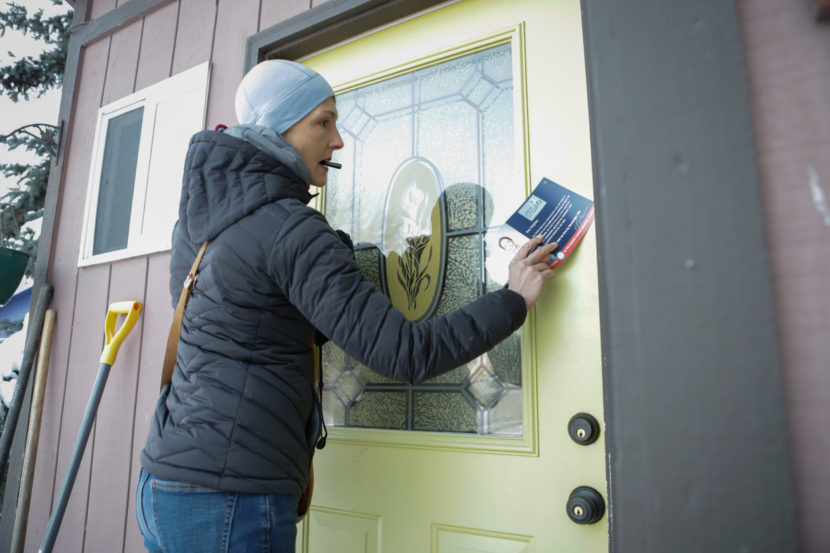
Because Storm’s district is new this year due to redistricting, there’s no incumbent to compete with, but her Republican opponent Craig Johnson previously held a House seat for nine years starting in 2007.
Storm, who’s framed her campaign around making sure public schools are adequately funded, said she didn’t want to let Johnson claim another two-year term.
“Part of me was just like, ‘I’m not going to let him win without some serious competition,’” she said.
Johnson pulled in about half the primary vote, while Storm and another Democrat made up about 46%. The other Democrat dropped out in late summer, leaving Storm with a tough but possible path to victory.
Storm isn’t completely new to politics. She worked as a part-time aide for Anchorage Rep. Andy Josephson and has been involved with Great Alaska Schools, a nonpartisan public education advocacy group. She also participated in Alaska Women Ascend, a training program for progressive women interested in running for office or working on campaigns.
She said the hardest part of running as a brand new candidate has been finding donors. Her professional connections as an architect have helped, but she said she’s mostly relied on small donors to fund her three-person team.
“And this is just a particularly difficult year. There’s 59 races, Lisa [Murkowski], Mary [Peltola] — I mean, all this money is getting siphoned off into these bigger races,” she said.
Benjamin Vincent, a property manager running as a Republican in Kodiak, is confronting similar issues. He said putting his name on the map as a first-time candidate has been a challenge, especially since his opponent is long-time Republican representative and Speaker of the House Louise Stutes.
“I don’t have a voting record like some other people do. Some individuals want experience, and those are difficult hurdles to get over,” he said.
Vincent, helped by a small team of volunteers, has for months been traveling throughout the district, which also includes Seward and Cordova, to meet voters.
“I have a willingness to come to your face and tell you what I’m going to do,” he said. “And I think that speaks volumes, even compared to having a voting record.”
Vincent grew up in a military family in Chugiak. They lived Outside and overseas for much of his childhood but he returned to Alaska to attend the University of Alaska Anchorage. He moved to Kodiak in March 2021. He said he and his wife put down roots on the island quickly, which has helped with those conversations about his limited experience.
Vincent came away from the primary with about a third of the vote. He said he’s running because he disagrees with some of Stutes’ choices as a leader, but he said there’s a benefit to running even if he doesn’t win.
“A lot of individuals that I’ve spoken to, and I have this belief too, say that competition builds a better candidate,” he said.
For Will Stapp, an Army veteran in Fairbanks, running for office is about continuing a life of public service.
“I believe that if you’re part of a community that you should try to give back,” he said. “But the main reason I do that is because I love Fairbanks. And the reason I love Fairbanks is because Fairbanks loved me when I was a young kid.”
Stapp is a Republican running in a three way-race for a House District that includes East Fairbanks and Fort Wainwright. He served two combat tours in Iraq and now works in insurance and volunteers with the Rotary Club.
There are no incumbents in Stapp’s race either. He came in first in the primary with almost half the vote, followed by a Democrat and another Republican.
Stapp said he’s paid close attention to the public process and was well-versed in the issues before he started running.
“But certainly chatting with thousands of constituents at this point … it’s been eye-opening,” he said.
He said he’s had to catch himself up on some state statute specifics and regulatory issues.
“But what I always tell folks is: If I don’t know the answer, I’ll look it up and get back to them,” Stapp said.
Stapp is running on a platform to reduce inflation and utility rates through fiscal discipline and responsibility. He said as a first-time politician he’s not guaranteeing any overnight fixes, but he is committed to reducing the level of division in Alaska politics.
“I tell folks in Fairbanks, especially given our unique challenges and our isolation, if we can’t be a model of how to kind of interact with each other even when we have political disagreements … what hope does the rest of the country have?”

